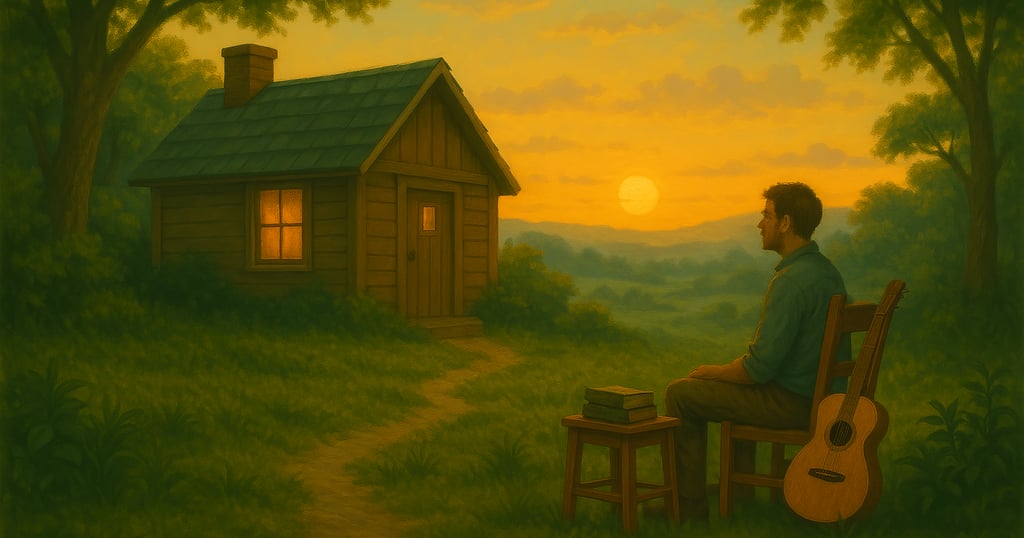

A song, a page, and dusk’s slow fall. The world exhales; his soul replies.
A gentle hush descends with the sun, as golden rays spill across wild hills.
The cottage hums in quiet company— its walls wrapped in ivy, in memory, in stillness.
A lone figure rests on the wooden stair, his gaze stitched to the horizon’s fire, as books nap open beside him, and a soft melody curls from a gramophone inside.
Here, green is not just color—it is comfort. The wind carries stories that do not ask to be told. And in this untouched fold of the world, time slows, exhales, and forgets itself.
In Quiet light
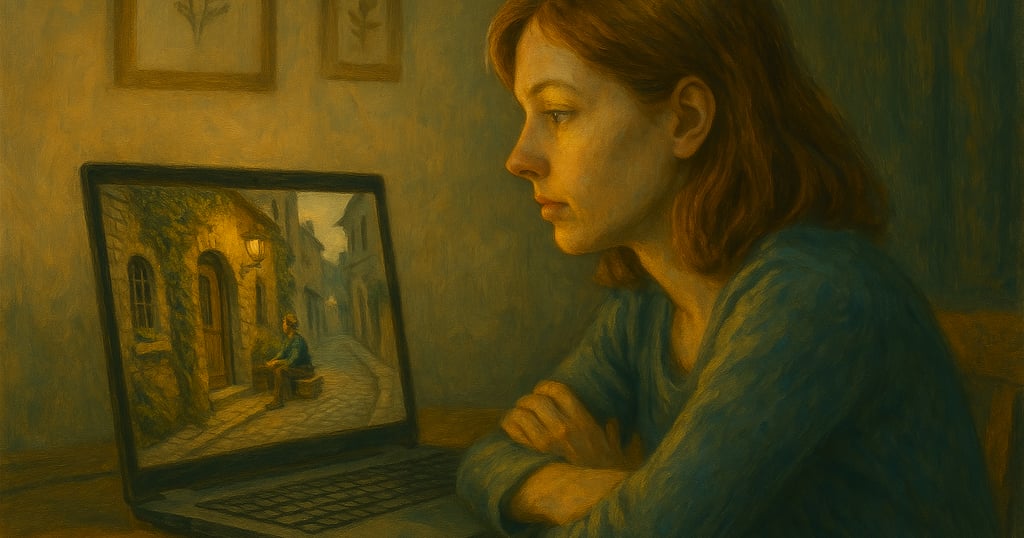

It began with a scroll—half-conscious, half-bored—through endless images on the internet. Then she paused. Not because the picture was remarkable, but because it was familiar. A sepia-toned alley with cobbled stones, ivy curling up weathered walls, and a lamppost leaning like it had been whispering secrets for years.
Mira stared at it.
Her tea had gone cold long ago. Her eyes, however, had gone warm. Because somewhere deep beneath years of forgotten dreams and ordinary days, something began to move.
She could smell lavender. Hear the soft clink of a bicycle chain. She saw—no, felt—herself in that alley, barefoot, younger, carrying books that were too heavy and a heart that was heavier still. There had been rain once. A boy with ink-stained hands. A promise made on a doorstep she didn’t know how she knew.
Science might call it cryptomnesia—a memory long buried, unearthed by a familiar trigger. Psychologists might speak of implicit memory, the brain’s whispered echo. But to Mira, it felt like time had folded inward, letting her touch a life she hadn’t realized she’d lived.
Maybe it wasn’t this life. Maybe it was the breath before this one.
And all of it—this spiral of emotion, imagery, and impossible truth—was conjured by a random picture on the internet. A digital window into a personal eternity.
She saved the image, not daring to explain it to anyone. Because some things—like déjà vu wrapped in poetry—aren’t meant to be proven. Only felt.
pastlife.exe
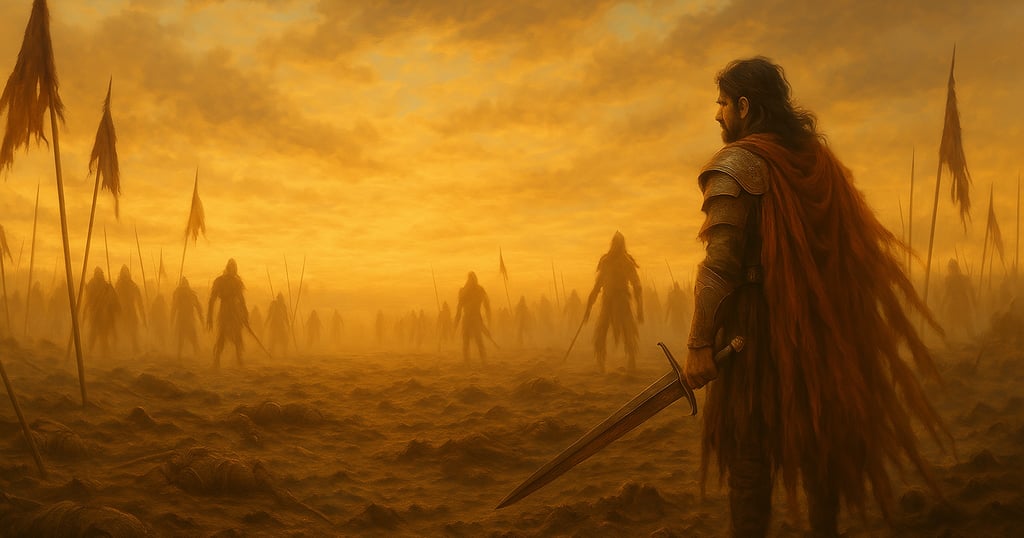

The battlefield was silent, save for the mournful whistle of the desert wind that tugged at shredded banners and scattered ashes of the fallen. The sun dipped low on the bloodied horizon, painting the sky in a melancholy hue of amber and crimson.
Aranya stood alone—his armor dented, his sword chipped, and his body wearied by days of relentless war. All others had fallen or fled. He remained, not out of stubbornness, but out of vow. The vow of a warrior who once made a promise beneath the banyan tree where his beloved Sarvani tied a red thread on his wrist and said, “Return to me, or let the earth hold you with pride.”
As he fastened his gauntlets one last time, flashes of his life danced before his eyes—not as regrets, but as reminders.
A childhood spent sparring with shadows beneath the citadel’s towers.
The warm smile of his mother, placing turmeric on his bruises.
The rush of triumph in his first campaign.
And Sarvani —oh Sarvani —with eyes like monsoon clouds, fierce and tender.
A horn blared from the enemy’s flank. Rows upon rows of armored men moved forward. The earth itself seemed to tremble under the weight of their approach.
But Aranya did not flinch. He stood tall—scarred, proud, and unyielding. He raised his sword toward the sky, letting it catch the dying light. The gold on his blade flickered like a flame refusing to die.
And then... he charged.
He moved like a storm, fury wrapped in flesh. Blade sang against blade. Each enemy that fell before him bore witness to his oath, to his heart.
But the body, however noble, is still mortal. As the final blow struck him down, Aranya fell to one knee, then the earth.
The silence returned—not out of peace, but out of awe.
He had died as he lived—undaunted. And though no bard sang that evening, the wind whispered his tale through the ages.
Some warriors are remembered not because they survived—but because they chose to stand when no one else dared.
The Last Stand
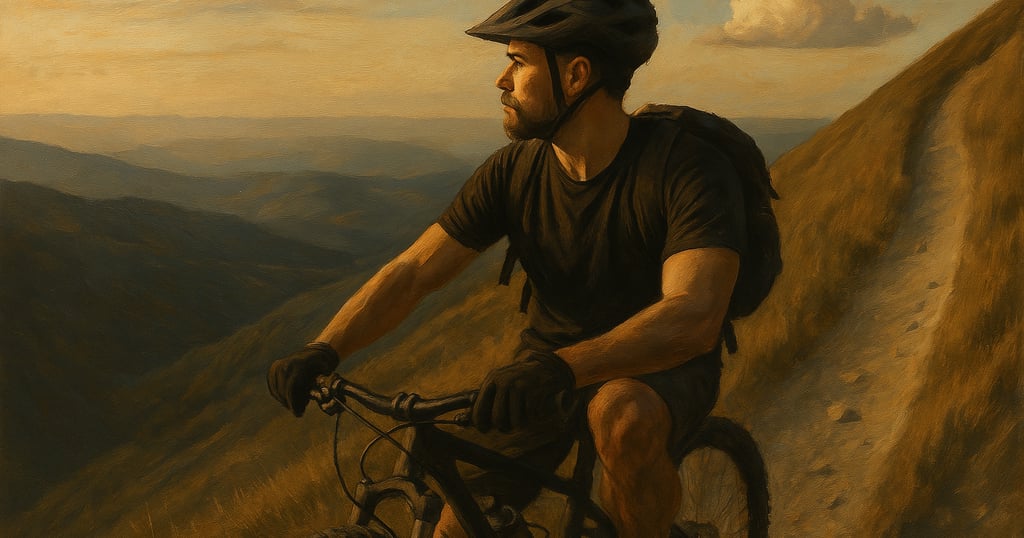

Kaali Dhaar — the Black Ridge. A place where trails turned inward. It wasn’t marked by danger signs or warning posts, because what it demanded wasn’t safety. It was honesty.
HE wasn’t chasing adrenaline. He came carrying questions, not speed. Silence had grown loud in his life. He wasn't looking to conquer the hill—he was trying to hear himself again.
As he climbed, the trail gnawed at him. Not just his muscles, but his memories. The time he hadn’t said goodbye. The year he disappeared into routine, thinking that was survival.
He fell, often. Not just physically—mentally. Doubts grew louder with altitude. "You’re not strong enough." "You’re chasing ghosts." "You’re wasting time."
But the hill never answered. That was its wisdom.
Midway, a storm rolled in—unexpected, like all storms of the soul. He took shelter beneath an overhang. Cold. Soaked. Alone. He thought about turning back.
But then, in the quiet between thunderclaps, he noticed something: The mountain had never once asked him to climb.
It didn’t judge. Didn’t whisper lies of glory or shame. It was. Unmoving. Unconcerned. Unimpressed. And somehow, that felt sacred.
Because in a world of constant noise and performance, Kaali Dhaar offered a rare gift: indifference. And from that, HE drew freedom.
He climbed the rest not with fury, but with reverence. He reached the summit; there was no wild celebration. Just wind. Space. And a stillness that mirrored his own.
He sat. Breathed. And in that moment realized: The journey hadn’t changed the hill. It had changed him. Not because he survived it. But because he saw himself clearly within it—and chose to keep going.
Where the Trail Ends
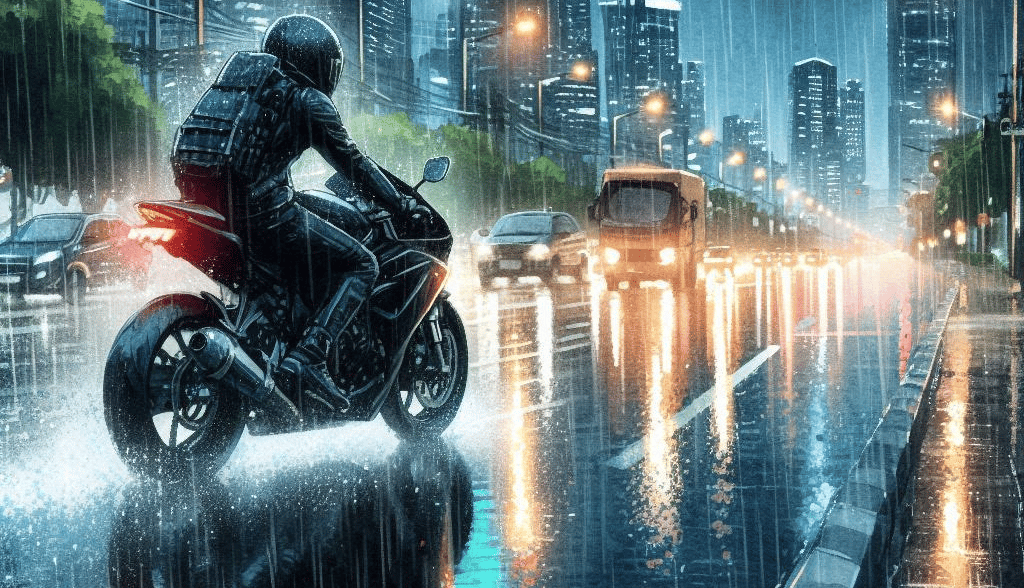

Rain slicked the city streets, turning neon reflections into puddles of memory. On his bike, cocooned in black gear and the rhythmic hiss of tire against wet pavement, the rider wasn’t racing through traffic—he was navigating the silent storm within.
He had always moved fast. Promotions. Deadlines. Reputation. But tonight, under this storm-laced canopy and towers blinking like sentinels of ambition, he wasn’t seeking achievement. He was listening. To the engine’s hum. To the raindrops drumming his helmet like echoes of forgotten questions. To the silence tucked inside movement.
Each turn through the city revealed new layers of himself. The rider had once feared stillness, mistaking it for weakness. Now he welcomed the solitude of motion. The weight in his backpack wasn’t just tools or tech—it was unspoken dreams, missed conversations, and the quiet hope of becoming someone deeper than output.
The rain didn’t blur his vision—it clarified it.
He noticed the way a stranger on the sidewalk paused to marvel at the storm. The way his own reflection—split by a puddle—seemed more whole than ever before. The way the city roared, not in chaos, but in a chorus reminding him: there’s beauty in the unplanned, poetry in the pause.
This ride wasn’t escape. It was integration.
Not a rejection of the world—but a turning inward, embracing the parts of himself he'd neglected in the pursuit of something “more.” He was no longer just a commuter in a city of speed. He was a seeker, tracing raindrops like breadcrumbs toward something real.
And in the language of road and storm, he heard the most honest thing he’d felt in years:
“You are more than where you’re headed. You are everything you choose to become, even while you’re still in motion.”
🌧️🛣️
Rainwalker: A Journey Between Motion and Meaning